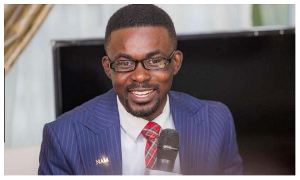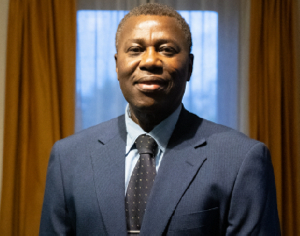Unknown to a lot of Ghanaians, the duality between their traditional and modern Ghana is gradually being resolved, more from the daily activities of Ghanaians themselves, their traditional institutions, their neo-liberal structures and the on-going global progress. The needs of the Ghanaian development soul are clear: policy-makers and bureaucrats should be able to juggle and mix Ghana’s two dualities in order to smooth out the development process. This will refine the developmental clumsiness in a country where most people think, wrongly, that their foundational traditional values are less important than the Western ones – which has created psychological and material challenges for the progress of Ghana.
Refining the developmental clumsiness will give balances to the development process which until recently Ghanaian policy-makers and bureaucrats have turned a blind eye. Attempts are under way. Among the many attempts to correct many an ancient error in the development process is the newly minted “The National Royalty Awards Project 2007” (Aug. 15, Ghana News Agency) that seeks to honour traditional rulers “for their involvement in development programmes within their communities.” This demonstrates the on-gong attempts to not only juggle the dualities of Ghana’s corporate existence but also mix the two, where appropriate, in order to resolve the schisms between them that have for long weakened many a Ghana progress.
The practicalities on the ground show how poorly Ghanaian elites have been midwifing Ghana in its development process – the dualities rupturing and longing for each other to be reconciled for progress through capable policy-making and bureaucratizing. "The National Royalty Awards Project 2007" is part of the attempts to open the floodgates of the two dualities and give respectability, confidence and dignity to a large part of Ghanaian culture for long suppressed, misused and untapped for progress. While there are inhibitions that need to be refined, the attempts of the group of Ghanaians who think Ghana’s progress needs a re-think by policy-makers and bureaucrats to work openly with the culture is not “returning to some” outdated, idealistic, and fruitless “pristine traditional cultural milieu to underpin the political arrangements of the modern nation-state,” as a critic erroneously claims, but to deal with the real Ghana in its progress.
From Mr. Sampson Kwaku Boafo, the high-driven Chieftaincy and Culture Minister, to Mr. Bernard Guri to Mr. Courage Quashigah to Dr. George Ayittey to Mr. Kofi Akosah-Sarpong, part of the growing thinkers who have been campaigning for Ghana’s development progress to openly factor in its traditional values, especially in policy-making and bureaucratization, none have been saying Ghana should be returned to some “pristine traditional cultural milieu to underpin the political arrangements of the modern nation-state.” But they recognize this is not an easy task, as the activities of the European Enlightenment thinkers and writers in the 18th century who waged campaigns against erroneous thinking, tyranny, and deadly superstitions, and ushered in the on-going Western progress, demonstrate. Like the European Enlightenment thinkers, their desire, informed by moral and factual rationalization, is to see Ghana’s progress balanced between its foundational traditional values and the global neo-liberal ones, driven by conviction and global exposure, and not material gains.
These thinkers, uniters not dividers of Ghana’s dual developmental values, come from different stations in life, academic and professional backgrounds and their campaigns are not just window-dressing as the institution of “The National Royalty Awards Project 2007" exemplifies. What they have been saying, and which is increasingly gaining attention nationally, regionally and continentally, is that because of colonialism Ghanaian traditional values, as foundational nourishment for progress, was suppressed for developmental transformation. Ghanaian elites who came after the colonialists did not help matters either. This situation has made the good
aspects of Ghanaian traditional values not appropriated for policy-making and bureaucratizing, and the inhibiting parts of the culture not refined either in the broader progress of Ghana. Recent reports of the growing rate of witchcraft and human sacrifices in Liberia and Mozambique and its implication in their progress attest to this.
Against this background, how better are Ghanaians willing live in a world that is increasingly being hybridized will be felt from how their core traditional values are opened up, dignified, respected, trusted, and touted as a confidence booster in their development process. That’s why Mr. Boafo said the award “aimed at exposing chiefs and other traditional office holders to the challenges of mobilizing people for development, as well as encouraging their people to eschew inimical practices in their areas of jurisdiction…also sought to identify and reward chiefs and other traditional office holders who exhibited far-sightedness in attracting development projects to their areas of jurisdiction.” The attempts are to engineer new national development policies and bureaucratization that work from the nuts-and-bolts of Ghanaian traditional values and with sharp eye for global progress.
From the ex-British colonists to first President Kwame Nrumah’s Convention Peoples Party government (formed in 1949, ruled from 1957 to 1966), which harshly marginalized traditional institutions/rulers, Ghanaian traditional institutions were relegated in the country’s progress, a process that has demeaned, weakened, and gravely undermined the confidence process of Ghana’s progress. Incumbent President John Kufour is boldly reversing this as we see in the fruitful activities of Mr. Boafo. Mr. Kofi Annan, former United Nations chief scribe, argues that Ghana has confidence problem with its progress – and pretty much of this is historical and material, which correction will need innovative policy-making and bureaucratization informed by Ghanaian traditional values.
No doubt, Mr. Bernard Appiah Okyere, which non-governmental organization, Bende-Royal Foundation International, partnered with Ghana’s Chieftaincy and Culture Ministry to institute the moral boosting chieftaincy prizes, explained that traditional institutions/rulers critically need “motivations to help them get back on course…Usurpation of the traditional functions of chiefs in the communities as agents of development has greatly affected the relevance of projects to the expressed needs of several rural communities, commitment and loyalty to programmes and projects initiated at the grassroots level.” There is no better way to encourage the suppressed Ghanaian traditional institutions for progress and, as the “The National Royalty Awards Project 2007” explains, signs of progress are all around. Get Cultured With Arts & Culture Festivals
Entertainment of Wednesday, 22 August 2007
Source: Kofi Akosah-Sarpong












